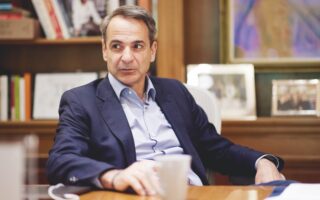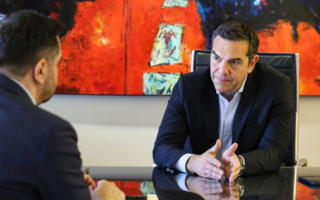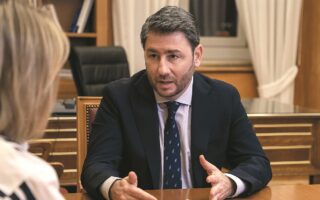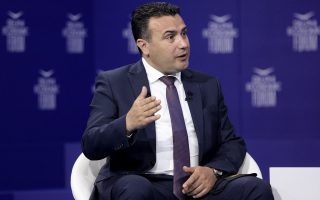‘If the people want me back, they must vote again’
New Democracy president promises great changes if elected for second term on June 25, stressing need for strong single-party government as ‘only option’
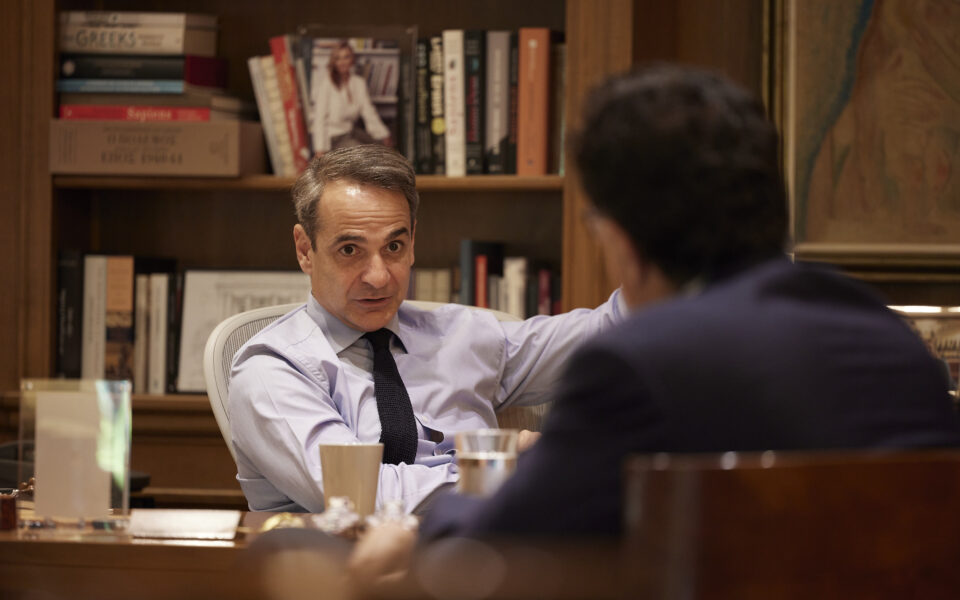
We met at the Maximos Mansion in Athens just a few hours after Kyriakos Mitsotakis handed over to the interim prime minister who will be taking Greece to a second general election on June 25.
In this discussion with Kathimerini, the president of New Democracy analyzes the result of the May 21 ballot – in which the conservatives routed leftist opposition SYRIZA – describes the government he wants to form and outlines his priorities for reforms. He also sends a message to his party’s officials, warning of the perils of complacency over the next ballot, and of arrogance.
Congratulations on your electoral victory. To start off, I’ll ask whether you were surprised and in what way.
Thank you. I was confident that we’d have a very good electoral result and believed we could match the performance of 2019. It was certainly a pleasant surprise to see that we more than matched it and even increased the absolute number of votes we got. Under no circumstances, however, could I have predicted the scale of SYRIZA’s collapse. It is unprecedented, since 1974, for the first party to get double the number of votes that the second did.
The result, I believe, also underscored a historic progression of Greek society in the manner it perceives the democratic imperative of participation. It was a reward for our work, but also, I believe, for rational political discourse. It shows a different understanding of politics that elevates the value of sincerity and trust, and soundly rejects the toxicity of vulgarity and hubris – that is, in short, SYRIZA’s political attitude.
One thing I’m hearing is, “He got 40%, so why should we vote for him again and give him carte blanche?” Is there an issue of absolute, uncontrolled dominance, without, moreover, a strong opposition, as seems likely?
I asked to be allowed to form a single-party government from the outset and if this is what the citizens want, they must reconfirm it with their vote. I am not asking them to do anything different than what they did in the first election. One must also bear in mind the arithmetic of the new electoral law: The more parties we have in Parliament, the harder it becomes to form a single-party government, so nothing should be taken for granted. The ballot boxes are empty now, and even though the May 21 election was a very good indication of how citizens will vote again, they still need to go and vote. The challenge then was to win. Now it is to govern. So, if the people want me back in the Maximos Mansion, if that is their choice, they must vote for me again.
Now to come to the part about whether an absolute majority in Parliament would give me free rein to do whatever I want; I’d say the opposite is true: The stronger the mandate, the greater the need for me to be more grounded and reticent so I can honor the citizens’ trust. I would also need to avoid any mistakes that may have been made during the first term. A strong government does not mean one that is not held to account, but an effective government. We’ve had strong governments in the past and I don’t remember this kind of discussion about them. Only strong governments can make big changes happen. I have never hidden my ambition for the second term to be one of very big changes. The stronger my legitimacy to make such changes, the easier it will be to implement them.
There is a chance – and a pretty good one – that we’ll end up with seven parties in Parliament. What will you do in the event of a marginal majority? Have another election? Reach out to PASOK and Nikos Androulakis? That’s one option.
That is, precisely, an ominous scenario that paves the way for new adventures. For a period of non-governance or paralytic compromises, even a third election. This is something Greek women and men must avert with their vote.
What I can say right now – also given Mr Androulakis’ stance after the elections – is that there is no other political option for the country than a single-party New Democracy government. I was not the one who burnt the bridges with PASOK. Mr Androulakis had a very deliberate strategy to turn PASOK further to the left and he certainly has no desire for any communication with me personally. Therefore, I do not see any other option for the country right now than a single-party government and, obviously, a strong one is preferable to one with a marginal majority. I had 158 MPs after the last election and I believe I was easily able to serve the agenda with a majority of this size, without feeling tied down by reliance, but also without getting above myself, which is something I will never allow myself to do and will certainly not allow my officials and future ministers to do.
So, what is the plan if you don’t get a clear majority and end up with 150 MPs in the 300-seat House or something along those lines?
I don’t want to get into that discussion; I didn’t do it in the last election, and I won’t do it now. It is, nevertheless, clear that a single-party government is the only option, not because I say so, but because everyone else says so. What I categorically rule out – I repeat – is cooperation with parties to the right of New Democracy. In absolutely no case is that happening.
The May 21 ballot also held a few surprises in terms of specific candidates. We saw quite a few new faces doing better than “traditional” ND cadres. Does this say something? Something about voters’ preferences?
I think that the citizens rewarded younger people. There is always a demand for new faces and this is something I want to uphold because I believe that it is essential for any party. I think that the choices made were also a reward of their modest attitude and a style of political discourse that deals more with results than impressions. I am pleased because our parliamentary group was significantly rejuvenated, something that is quite unusual, as you know, for ruling parties. But this is also where I want to stress that the really hard battle still lies ahead. I understand that the candidates are tired, but I will not simply ask them, I will demand the same commitment to the electoral battle we are in right now, which is for the common good, and that is nothing more than a clear win for New Democracy with a strong majority. If there are those who believe this is the time to get some rest after being elected, they should know that this is not acceptable to me and will be taken seriously into account down the line.
What kind of government will this be? A Mitsotakis government, or an ND government? There are some old-school party cadres and supporters who accuse you of being too similar to the former centrist To Potami. How do you respond?
It will be a New Democracy government, but it will be New Democracy as it has become. An inclusive government that emphasizes meritocracy and the abilities of its officials, so that they are in a position to carry out the mission I will assign them. I want to be certain that the officials I assign missions to will be able to carry them out. I’d say that I am less beholden than in the past on keeping the customary balances that a leader ought, perhaps, to keep. It will be a government designed to work hard, with more women and with a lot of rotations – to use a basketball term – meaning much more frequent changes compared to the outgoing ND government.
Second terms are rarely more successful than the first. What have you learned from the examples of the second terms of Kostas Simitis with PASOK and Kostas Karamanlis with ND?
I enjoy studying history as much as you do, so this is precisely why I want to avoid the second-term “curse” of lackluster effort and compromise with the electoral result. I banish the thought. First of all, on a personal level, I have so much energy and so much drive to do even more than I did in the first term. I have much more experience too. Even though I regarded myself as well prepared to assume the responsibility of governing the country in 2019, I learned a lot over the course of those four years. I too have learned from my mistakes. I know much more about how to keep the government machine well-tuned. There is one thing that will not change – and which sometimes makes even my closest associates despair – and that is how hands-on I like to be with every problem. That will continue to be the case in the next term. We will be talking about an entirely different Greece in 2027 – and that is my aspiration. I have no intention of going down in history as a prime minister who settled for a management role. I have no such ambition. I know that we are looking at an enormous opportunity. I know what the citizens demand of us. They’ll always be telling us to “step on it” and I have an obligation to meet their expectations. The 40% that voted for us did not do so this time because they were trying to get rid of the previous government. I believe that it was a positive vote of confidence, a call for acceleration, and a vote that had a very interesting social makeup, with very strong support for ND in age and social groups where it did not previously have such a presence. What happened in Western Athens was especially impressive. We proved our party’s social credentials; when Perama gives us 37%, this means that people who have very big problems care about their prospects, their jobs and their environment, and we also believe that we can make their lives better. This is, after all, what politics is all about. And this is what was ultimately judged in this election: who deals with the real problems. People have worries. There’s also the toxicity of social media, which was proven to be completely different to reality. In this regard, too, I hope all the political forces have learned a lesson. Judging by some of the statements I have been hearing from SYRIZA officials, I have serious doubts as to whether they truly understand what happened.
What happened in Western Athens was especially impressive. We proved our party’s social credentials; when Perama gives us 37%, this means that people who have very big problems care about their prospects.
Some cynics may say that the reason you did so well in Western Attica was because of the subsidies the government distributed during the pandemic, the energy crisis etc. The European Commission recently said in a report that this policy needs to stop. Is there concern that people will become disgruntled if the subsidies stop?
I am very proud that we were able to keep society on its feet, to protect jobs and ultimately to support the vulnerable during the pandemic and the energy crisis in a targeted manner. It was not the most popular policy. I assure you that reducing value-added tax and the special consumption tax would have been much more popular. But we decided against this, first because it would not have worked economically and second it would have been socially unjust, as it would benefit everyone and not just the economically vulnerable. So we used the fiscal space at our disposal and were able to support the most vulnerable. And that is something we will continue to do. On the other hand, I have often said that a policy of subsidies is temporary by nature. It is an emergency solution to an emergency problem. The only permanent solution is growth, increasing salaries and improving disposable income.
And since you ask about our fiscal assessment, I believe that we have systematically succeeded in beating fiscal targets for two reasons: First, because the economy is overperforming, growth is higher and therefore so are revenues, but from growth, not overtaxation. Secondly, yes, we still have a lot to do to combat tax evasion, and this has already started being done with electronic payments and better cross-checking. And this gives us more resources to work with.
Are you at all concerned by the fact that much of the growth we have been seeing is focused on real estate and tourism?
I am not at all sure that this is entirely precise, because if we look at the Greek economic data, we will see, for example, a sizable increase in exports. Exports are not just tourism. Exports are production, the primary sector. I envision a society and an economy that has a broad production base and is not entirely reliant on tourism. I also refer to other services here, such as education and health, where the country can play a leading role.
But the current account deficit is growing.
And it has gone back down. A large part was energy; that’s why it rose. Now it’s contracting again because energy prices dropped. And to talk about energy, in an economy where 80% of electricity will be solar, this means less natural gas imports. Add to that the significant contribution of the high-tech sector to the gross domestic product, where very important steps are being made, and you will see that we are talking about an economy that is not dependent only on tourism or real estate, which is another area where we have to introduce a form of growth that is environmentally friendly. I spoke earlier of “stepping on the gas.” This is where I’m stepping on the brakes. There is no way, under my stewardship, that we will destroy sensitive ecosystems like our islands. One of the most important reforms we have passed, “under the radar,” is a local urban planning strategy that is being prepared for every municipal unit in the country. It is a massive reform and it has to do with how we organize space, what we build on it and how we build it. If we see things getting out of hand anywhere, you can rest assured that we will intervene. Just as we intervened in Mykonos and proved that when the state wants to, it is perfectly capable of dealing with lawlessness and delinquency.
You have associated your personal “brand” with environmental protection. Is this an area where you could say mistakes were made given that one draft law was partially resynched and that the situation on Mykonos had gone unchecked for three years?
An economy emerging from a deep crisis will put growth first. That said, I do not believe that the natural environment has been compromised in any way during our stewardship. Quite the opposite, I would say, as we now have a single agency that is responsible for managing protected areas in a much more reliable manner. As I said, we have also made significant interventions in zoning, which ultimately deal with the biggest wound to Greece’s natural environment, which is irregular construction. We passed legislation and closed the loopholes. I came under a tremendous amount of pressure on this matter, but I insisted on our policy line. Many people asked the government for certain specific amendments – it happens, you know, it’s part of the democratic process. We did away with many amendments we thought were damaging to the environment. We set specific goals for the protection of our seas and for restricting plastics, we protected mountains from being developed. Can any of these “environmental illuminati” pointing the finger show me one specific thing we did that damaged the environment? Because I can point to 10 things we did to improve it.
I do not believe that the natural environment has been compromised in any way during our stewardship. Quite the opposite, I would say.
The counterargument is that in places like Mykonos, the situation would have carried on as it was if it were not for the attack on the archaeologist that drew attention to the rackets operating there. For three years, someone was obviously not doing their job.
There is some truth in what you say, sure, but Mykonos was nevertheless in our crosshairs before that happened. But it was the straw that broke the camel’s back.
I would like to turn to the priorities you have in mind for a second term, to the three or four things you would absolutely want to accomplish.
The first priority is the economy, growth with different characteristics. What are these? Growth should reduce inequalities and improve incomes, especially for salaried individuals; it should be friendly to the environment; and it should be digital and should underscore the country’s advantages. The second priority is public health. That is a challenge I have taken personally. I think we all became familiar with the National Health System during the pandemic. I learned a lot and I think that I have a very good idea of what needs to be done. I expect to carry out great changes at our hospitals, interventions that have to do with emergency cases, with our doctors, with the hirings that need to be made and the way we staff our medical facilities, especially in remote parts of the country. And these changes must be in primary care, in prevention, in digital healthcare.
Some things have been accomplished in education and others have been left in limbo, such as the campus police force, which was one of your top commitments. Is there any point to such a security force?
I believe that we need to keep a clear head to assess how we can make our universities safer. The campus police force did not work to the extent that we wanted it to. On the other hand, it is staffed right now with people who can be used and who the students feel are at their service. I have to say that excellent work is being done at many regional universities and the image there is entirely different to that at some big universities. Our universities are building partnerships abroad, developing non-Greek programs and connecting more to the world of research and to industry. We now have industrial PhDs being carried out at our universities; these are significant inroads.
Why didn’t you shut down the university departments that were created by the merger with technical colleges carried out under the previous SYRIZA-led administration?
Because it could not be done. On the other hand, the minimum pass grade for university admission was a very difficult reform and not at all popular. It was essential, though, because I have a responsibility to all the 18-year-olds to prevent them from getting into a department they will most likely never graduate from and for something they weren’t even interested in. It also allows universities to assess which departments are competitive so that they can assume the responsibility themselves. I am very proud of what is being done in the area of technical and vocational education, about how many youngsters are choosing public technical colleges over universities so they’ll end up with a diploma that is valued in the job market. We all know that there are very good career prospects in specialized fields that do not necessarily require a university degree. This also requires a change of mentality in Greek culture, which is why the minimum pass grade was such an important reform – but also so difficult politically.
The justice system remains one of the areas in greatest need of reform.
That is the third reform I was referring to. Steps have been taken, but we need leaps. And when I say leaps, I am not just referring to the ability to give our courts more support or to introduce technology more aggressively, but also to interventions that have to do with the quality and speed of decision-making, with the evaluation of judges. The justice system enjoys complete independence, but we create the operating framework, such as, for example, how the Judges’ School operates, how we educate our judges and how we train them from now on.
I will not take a single step back from the policy of strict border protection, be it at the land border where the fence will be competed, or the sea border where the coast guard’s means are constantly being strengthened so it can carry out its mission.
There have been reports and statements from the European Commission pointing to investigations into pushbacks of migrants at Greece’s borders. Is there any truth to these reports?
No. And every complaint is investigated. That said, let us distinguish between what some people call pushbacks and the country’s need to protect its sea border with Turkey. This is not going to change and I have explained this to the Europeans. I have explained why we act within the framework of European regulations that allow us to stop a boat on our border and request that the Turkish Coast Guard take responsibility for returning it to where it set sail from. I will not take a single step back from the policy of strict border protection, be it at the land border where the fence will be competed, or the sea border where the coast guard’s means are constantly being strengthened so it can carry out its mission. We implemented a strict but fair policy on migration. We protected our country’s borders while also saving thousands of lives at sea and putting a stop to tens of thousands of migrants and immigrants having to live in hellholes like Moria.
What would you say your biggest mistake was during your four years in office, and what have you learned from it?
Mistakes were made and acknowledged, I think, with courage. I believe that it is often best not to settle for the first answer someone gives us. To keep digging. And this means, as odd as it may sound – because the “executive” state I envisaged came under fierce criticism – more control, so that we can be absolutely certain that we are getting the right information and getting messages from many different sources. It is easy when you’re in office to yield to the temptation of only hearing what you want to hear. The biggest lesson, I think, is to learn to step out of your comfort zone, to do things that may not come easy and to not settle for a way of working that you may often know needs to change.
Let me ask you about the wiretaps. A tangible act of self-criticism would be a thorough investigation of the issue. If, for example, the opposition demanded a special investigation, would you agree to it?
This is a delicate and tricky case that cost us politically – there is no doubt about that. But I am very satisfied with the changes that took place from there on. I also think that the National Intelligence Service (EYP) works better now, not to denigrate its role before the wiretapping affair. I was always kept very well informed by EYP on the crucial issues of external security and this is, ultimately, its role. From there on, if the opposition wants to hold another special inquiry, it always can; the Constitution gives it that right.
Does that mean that you believe only the justice system can investigate the matter from now on?
Of course. Only the justice system. I don’t think any other matter was discussed publicly to the extent that this one was. It was discussed during the pre-election campaign, it was discussed in Parliament, and I was always open to answering any questions put to me. But there comes a point where we need to stop and move on in terms of the issue’s political dimension. Justice is completely independent and it will move at its own pace.
Can you see a day, after the elections, when you may call Mr Androulakis to try and reach a consensus on certain matters?
I imagine this will happen at some point. Unless, of course, he insists on not wanting to meet with me even then.
But you have also said that you don’t feel there is much to talk about with him.
No, hang on a minute, that is not so. I asked to meet with Mr Androulakis from the first. He avoided me like the pox, while at the same time saying that I shouldn’t be prime minister, regardless of the people’s vote. He has a specific strategy: He wanted to pit PASOK against ND and was only interested in strengthening his position in the opposition and not in how the country would be governed. And that is abundantly clear now that he has rejected every possibility of cooperation, even if ND ends up with 149 MPs. By this it should be even clearer that if ND does not win with an outright majority on June 25, the country will be in for more adventure. According to Mr Androulakis, even, perhaps, a third election in August. I am sorry, but I don’t think that even PASOK’s friends want instability and more political turmoil. So, Mr Androulakis may be concerned about his percentage in the opposition, but the citizens are concerned about whether the country will have a stable and strong government tomorrow. And for this to happen, New Democracy has to win with an outright majority on June 25. After Mr Androulakis making his position so abundantly clear, there is no other option.
Could this change on June 26? That’s what I’m asking.
At some point obviously, after he is a political leader elected to Parliament, at some point I believe this issue will come to an end and we’ll be able to sit down and talk. There are a lot of issues lying ahead of us, after all, like the constitutional review or the law on the vote of Greeks abroad. One of the first laws I plan to bring to Parliament is changing the way that Greeks abroad vote. So few cast a ballot after all. It was a first step and it was very moving to have Greeks voting from abroad, but we need 200 MPs to make this change, not 180, so I would obviously have to talk to him about it. I will always seek as broad a consensus as possible, just as we did during our first term in government. Let me just remind you that PASOK, which is so set against our government and believes us to be the greatest evil that could befall this country, had helped pass many laws by that same government over the last four years.
Everyone I told about this interview asked me to ask you two things: One was whether the result of May 21 went to your head and the other is what you plan to do in the first 100-120 days if you are re-elected.
I think I’ve already given you a clear indication as to the second part of your question.
So you already have legislation ready to go?
Of course, just as there was last time. And there are loose ends we haven’t finished tying up, as well as emblematic draft laws that will define the government.
As to the first part of your question, I have observed something about myself that I find quite interesting: The longer I spend in this office, the more the opposite is true. I feel a greater need to be more cautious, more reserved, to keep my ears open to the people’s problems. That is the main reason why I do so many tours; it is not so much to talk, as to listen as well. I learn something on every tour and I am committed, I would say, to doing better, to helping my associates to do better and for my associates to help me do better. I am certain that this will not change. There’s something I must tell you: I had trouble sleeping on election night, and that’s an oddity for me. And it wasn’t joy keeping me up; it was the sense of responsibility, so I don’t think there’s any risk of it going to my head.
A slogan that was particularly disparaging of you became somewhat popular in the past couple of years. Did you know about this?
I don’t know if these people really existed, or were just a tiny minority. I never encountered it, honestly. This society never existed for me.
It is obviously not a part of society that is your audience.
But I don’t move in my own circles at rallies. This is a tiny minority, which was magnified and politicized by a leading political party. And maybe this is the reason why this political party dropped from 35% to 20%. I don’t think there has been a prime minister since 1974 who has been as maligned, as insulted and slandered, as belittled, as I was. I have been through some very hard battles, but I don’t think this kind of thing happened even in the 1980s. The confrontation was always tough, but the vulgarity, the personal targeting, the targeting of families, wives and children in the electoral race is something we saw for the first time. I also believe that it is now in the past. That said, I did do something I feel was very useful: I took all the social media apps that are known for their toxicity off my phone. I simply stopped looking at them entirely. And I think it has been nothing but good for me.
There are people who feel that economic development does not affect them. And one example that I found interesting is that while your low-interest mortgage program for young people is extremely popular, too many people can’t find homes to buy because they’re just too expensive. What do you say to them?
First of all, I think there are a lot of houses to cover the program. In any case, the issue of housing will concern us much more from now on. And it’s not just the “My Home” program. The program for renovating apartments for young people or young couples has just come out, which is also very important because we have too many apartments today which are basically falling apart and cannot be used. Consider a parent who can donate their apartment to their children for free, but there is no money to renovate that apartment. So we come in and intervene with this particular program, which is only aimed at young people and it is important. This is 300 million euros for 20,000 beneficiaries. It is the “Renovate-Save” program. But the problem of housing cannot be solved overnight. Interventions will definitely be needed in Airbnbs as well, some regulations, without killing a market which also contributes. And without affecting small property owners. We can, I think, find a balance which deals with the problem of housing on terms that will be more favorable than those that exist today.
Do you have any predictions on the elections in Turkey? Do you have a preference?
I don’t have a preference, but even if I did I could never express it publicly. There is a front-runner, that much is clear. But beyond that I am not at all sure that whoever is elected will mean any drastic change in Turkey’s foreign policy. On the other hand, I fully recognize that every new political beginning in Greece and Turkey is an opportunity to re-evaluate what was done in the previous four years and possibly for a framework of better understanding and more peaceful coexistence with each other. That will be my intention. However, I will also emphasize something crucial: It doesn’t only matter who will govern in our neighbor, but who will hold the steering wheel in our own country as well. It is yet another reason that makes the June 25 ballot crucial.
Will you seek a meeting quickly?
We have an upcoming NATO summit. I will seek a meeting with whoever the Turkish people choose and I want to repeat that our main difference with Turkey, the delimitation of maritime zones in the Aegean and the Eastern Mediterranean, has not been resolved for more than 40 years. It is a difficult dispute to resolve, we can resolve it according to international law, but we can also learn to live with our differences. If we cannot make significant progress, we must at least recognize that it is not necessary to have constant provocations, which put us in a permanent state of tension.
A feeling was created that there was an understanding, a moratorium in the pre-election period. Was that true? What was it about and will it continue?
Of course, and it can continue. It was informal, I didn’t pick up the phone, but I think there was a mutual understanding after the earthquakes. I see no reason why this good business climate cannot continue.
I am reading a scenario coming from the right of New Democracy, which says that after the elections there will be a “Prespes of the Aegean” type of deal [in reference to the Prespes Agreement that was signed between Greece and North Macedonia resolving the name dispute]. Can you clarify what your own red lines are? Let’s say, is the demilitarization of the islands and Turkey’s so-called “gray zones” a red line?
The only issue we can discuss with Turkey and possibly take to The Hague as well, is the delimitation of the maritime zones – i.e. the exclusive economic zone and the continental shelf. All other issues simply cannot be discussed. The issue of demilitarization and obviously all issues concerning Greek sovereignty over the Aegean islands are off the agenda. It is something that Turkey must realize, otherwise we simply will not be able to move forward.
